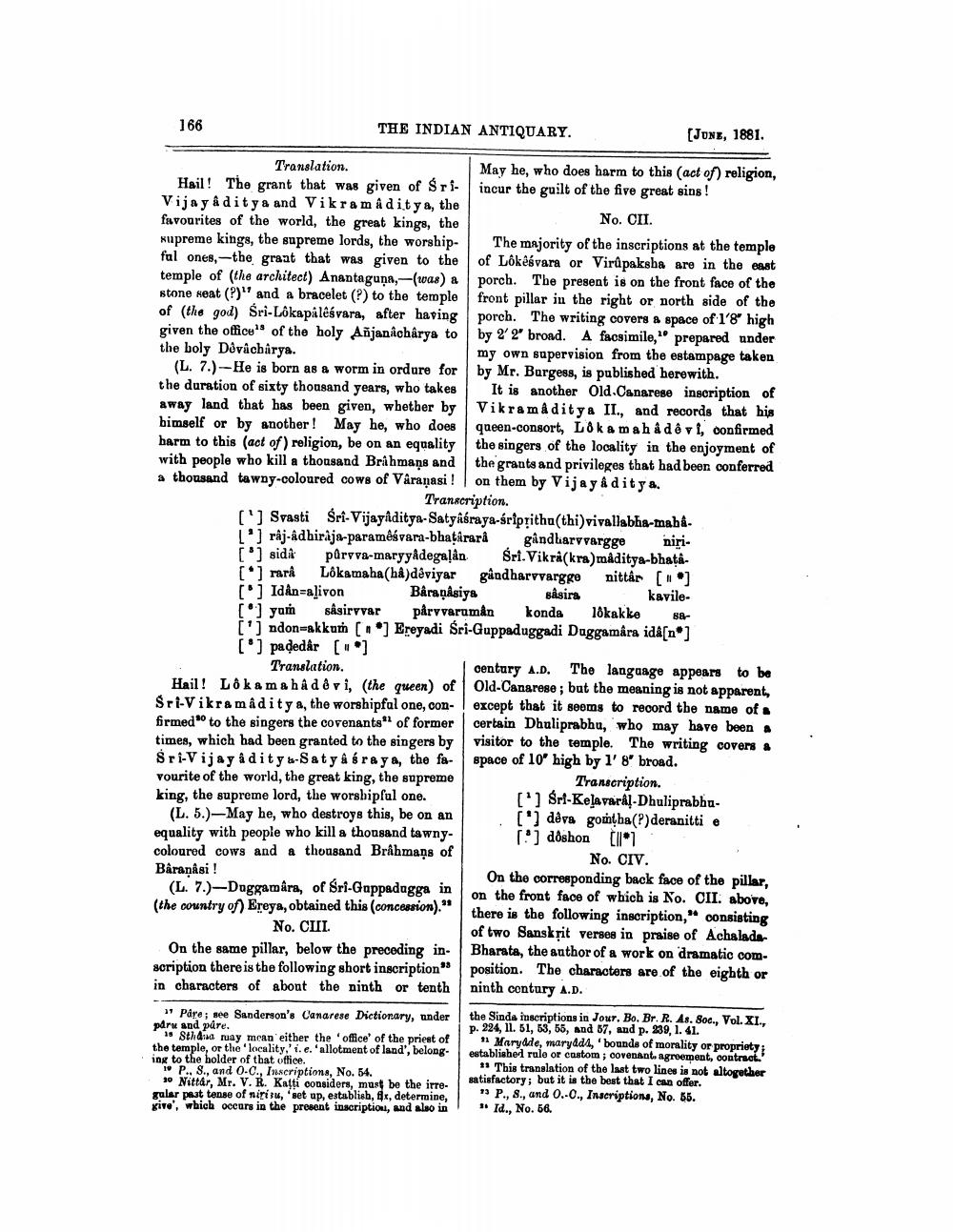________________
166
THE INDIAN ANTIQUARY.
Translation.
Hail! The grant that was given of SriVijay aditya and Vikramaditya, the favourites of the world, the great kings, the supreme kings, the supreme lords, the worshipful ones, the grant that was given to the temple of (the architect) Anantaguna,-(was) a stone seat (?) and a bracelet (?) to the temple of (the god) Sri-Lôkapálêsvara, after having given the office of the holy Añjanâchârya to the holy Dêvacharya.
No. CII.
The majority of the inscriptions at the temple of Lôkêśvara or Virupaksha are in the east porch. The present is on the front face of the front pillar in the right or north side of the porch. The writing covers a space of 1'8" high by 2' 2" broad. A facsimile, prepared under my own supervision from the estampage taken by Mr. Burgess, is published herewith.
It is another Old.Canarese inscription of Vikramaditya II., and records that his queen-consort, Lôk amahadevi, confirmed the singers of the locality in the enjoyment of the grants and privileges that had been conferred on them by Vijayaditya. Transcription.
(L. 7.)-He is born as a worm in ordure for the duration of sixty thousand years, who takes away land that has been given, whether by himself or by another! May he, who does harm to this (act of) religion, be on an equality with people who kill a thousand Brahmans and a thousand tawny-coloured cows of Varanasi!
[Santi St-VijayAditya-Satyáraya-selprithe(thi)vivallabha-mahi [] raj-âdhiraja-paramêsvara-bhațârarå gindharvargge niri[*] sida parrra-maryyldegalla Sri. Vikri(kra)maditya-bhat[] rara Lôkamaha (ha)dêviyar gandharvvargge nittår [""] [*] Idân=alivon Bâranâsiya kavile[] yum sâsirvvar pårvvarumân konda lokakke 88L'jndon-akkush [] Breyadi Sri-Guppaduggadi Daggamåen idd[n] [] padedâr [*]
sâsira
Translation.
Hail! Lôka mahadevi, (the queen) of Sri-Vikramaditya, the worshipful one, confirmed to the singers the covenants" of former times, which had been granted to the singers by Sri-Vijay aditya-Satyasraya, the favourite of the world, the great king, the supreme king, the supreme lord, the worshipful one.
(L. 5.)-May he, who destroys this, be on an equality with people who kill a thousand tawnycoloured cows and a thousand Brahmans of Bâranâsi!
(L 7.)-Daggamira, of Sri-Guppadagga in (the country of) Ereya, obtained this (concession)."
No. CIII.
On the same pillar, below the preceding inscription there is the following short inscription" in characters of about the ninth or tenth
[JUNE, 1881.
May he, who does harm to this (act of) religion, incur the guilt of the five great sins!
11 Pare; see Sanderson's Canarese Dictionary, under páru and pâre.
15 Sthana may mean either the 'office' of the priest of the temple, or the 'locality,' i. e. 'allotment of land', belonging to the holder of that office.
1 P., S., and O-C., Inscriptions, No. 54.
20 Nittár, Mr. V. R. Katti considers, must be the irregular past tense of nirisu, 'set up, establish, fix, determine, give', which occurs in the present inscription, and also in
century A.D. The language appears to be Old-Canarese; but the meaning is not apparent, except that it seems to record the name of a certain Dhuliprabhu, who may have been a visitor to the temple. The writing covers a space of 10" high by 1' 8" broad. Transcription. [18-Kejava-Dhuliprabba [] dêva gomtha(?)deranitti e [*] dôshon [||*
No. CIV.
On the corresponding back face of the pillar, on the front face of which is No. CII. above,
there is the following inscription," consisting of two Sanskrit verses in praise of AchaladaBharata, the author of a work on dramatic composition. The characters are of the eighth or ninth century A.D.
the Sinda inscriptions in Jour. Bo. Br. R. As. Soc., Vol. XI., p. 224, 11. 51, 53, 55, and 57, and p. 239, 1. 41. "Maryade, marydd4, 'bounds of morality or propriety: established rule or custom; covenant. agreement, contract."
This translation of the last two lines is not altogether satisfactory; but it is the best that I can offer.
13 P., 8., and O.-C., Inscriptions, No. 55. " Id., No. 56.




